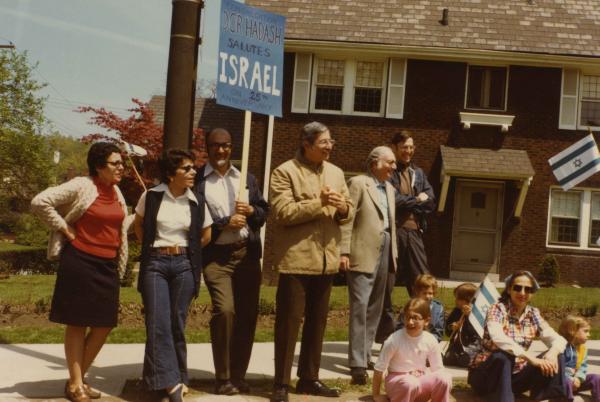

Hebrew Institute Director Dr. Solomon Abrams convened Dor Hadash Congregation in 1963 as a place for local unaffiliated Jews to meet for prayer and study.
An early “Statement of Principles” created by this group described Judaism as “evolutionary” and proposed a progressive agenda anchored in tradition. The statement encouraged the use of Hebrew, dedication to the State of Israel, and a sense of Jewish peoplehood, while advancing gender equality and announcing a broad vision for incorporating social justice into daily Jewish life.
Always committed to operating “in a democratic manner” and avoiding “all elements of commercialism,” Dor Hadash resisted or delayed many of the standard conventions of congregational development. It waited until 1966 to incorporate and until 1969 to join the Federation of Reconstructionist Congregations and Havurot, later known as the Jewish Reconstructionist Federation and now called Reconstructing Judaism. It operated on a “town-hall” structure until 1989, when it reorganized with a traditional board of directors and committee chairs. Eager to keep overhead low, Dor Hadash always rented meeting space. The congregation occupied the Wolk Chapel of the Hebrew Institute from 1963 to 1995, when the building was sold to Yeshiva Schools. The congregation spent the next three years at Rodef Shalom Congregation and used the Jewish Community Center during the High Holidays. It moved to the Kahn Auditorium of Community Day School in 1997 and remained there until it relocated to the Tree of Life building in 2010. Dor Hadash also rented office space at the Labor Zionist Education Building for many years.
The children of Dor Hadash attended religious school at the Hebrew Institute until the 1987, when members Doris Dyen and Janet Seltman established the independent Reconstructionist Children’s Study Group. The school expanded in the mid-1990s, after the dissolution of the Hebrew Institute, changing its name to Dor L’Dor [Generation to Generation]. The school became more closely affiliated with the congregation in 2004 as the Dor Hadash Religious School but always remained administratively independent.
In its ongoing effort to encourage member participation and reduce expenses, Dor Hadash long preferred lay-leadership over professional clergy and staff. It had only one paid position through its first 45 years. Students filled the rabbinic needs of the congregation through a series of short-term engagements. From 1987 through 2019, member Cheryl Klein served as a congregational cantor. She returned to the congregation in that position in 2020 and 2021 on an interim basis. (Having recently been ordained, Klein was referred to as "Rabbi" in deference to her degree, but the congregation did not commit to retaining rabbinic leadership at that time.) Dor Hadash hired an administrative assistant in the late 1990s to oversee the daily business affairs of the congregation. Throughout its history, the members of Dor Hadash perennially debated the question of whether to employ part-time rabbinic leadership but consistently preferred to remain lay-led and to hire rabbis for limited engagements. Congregation Dor Hadash hired Rabbi Amy Bardack in mid-2022 to support the activities of the congregation while continuing to view itself as lay-led and democratic in nature.
